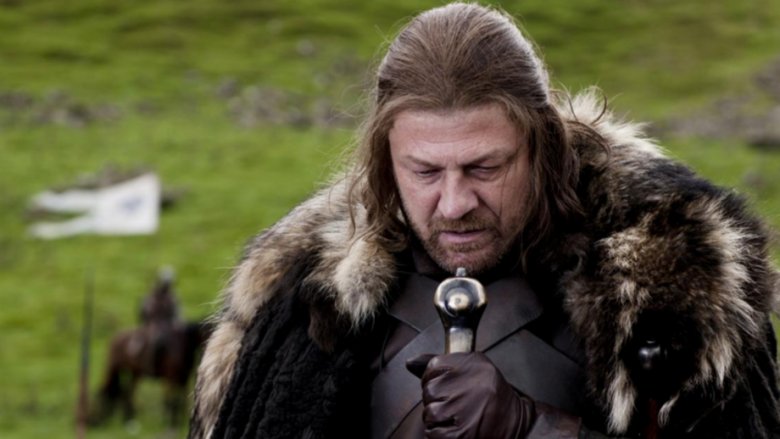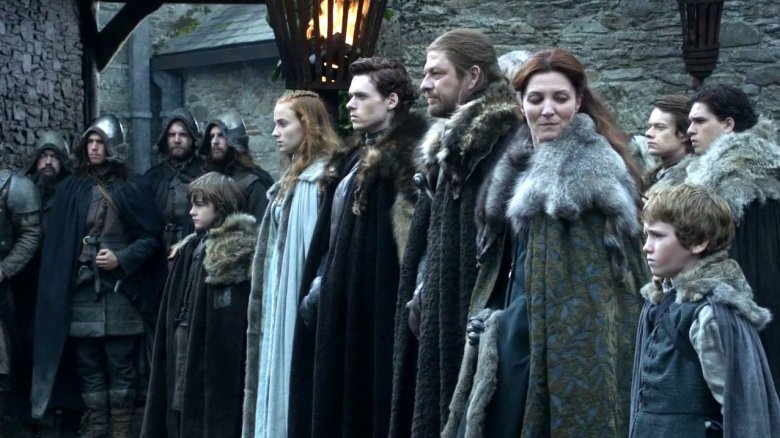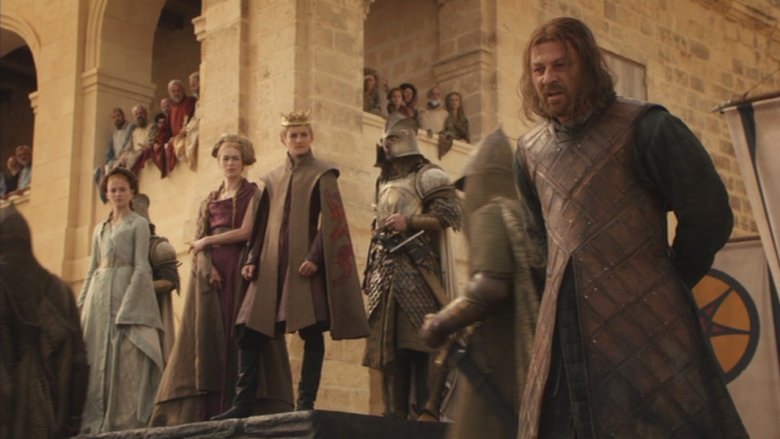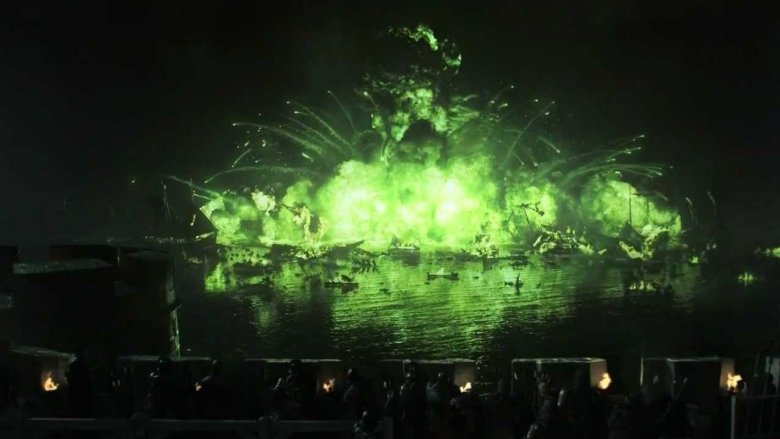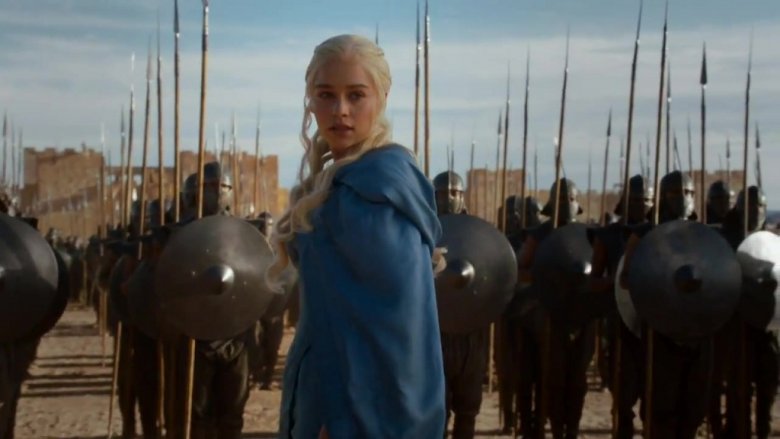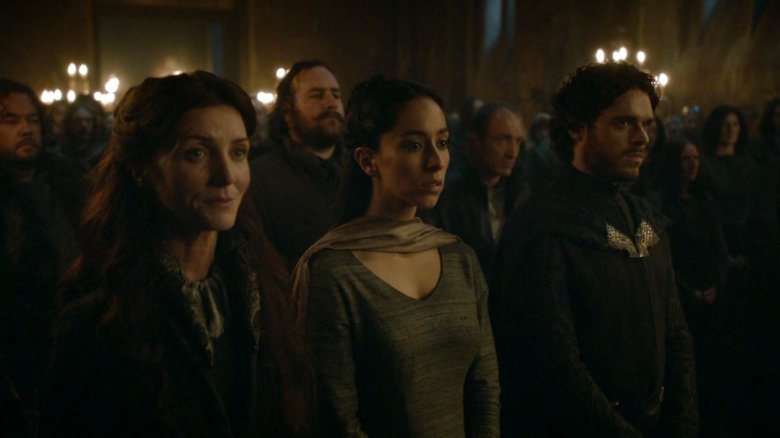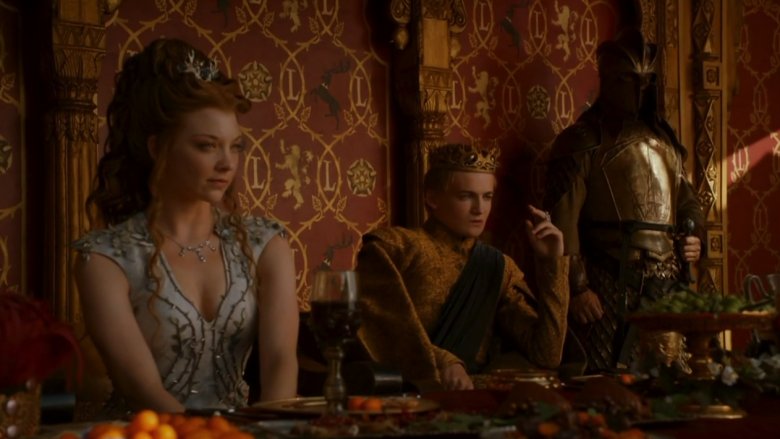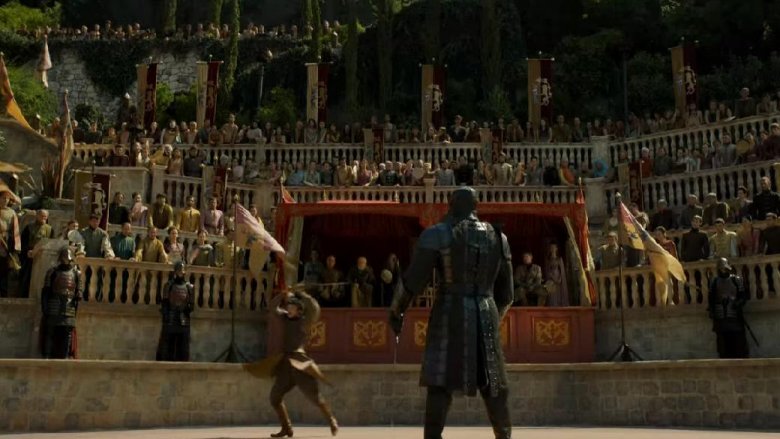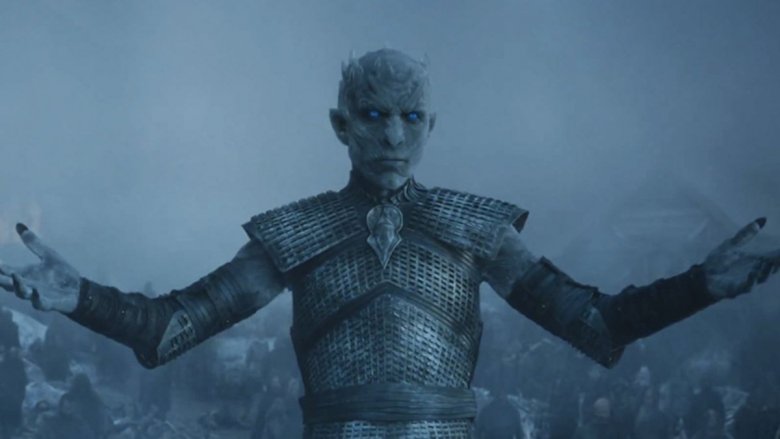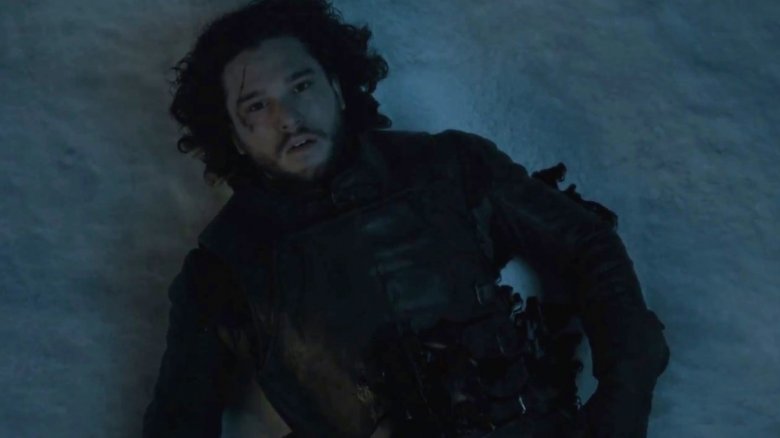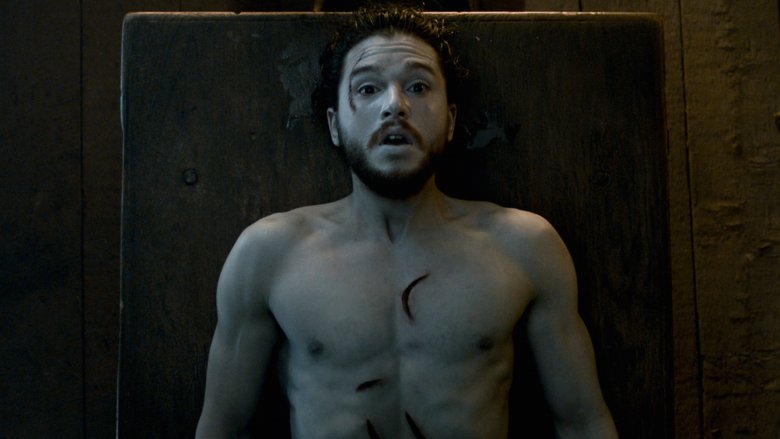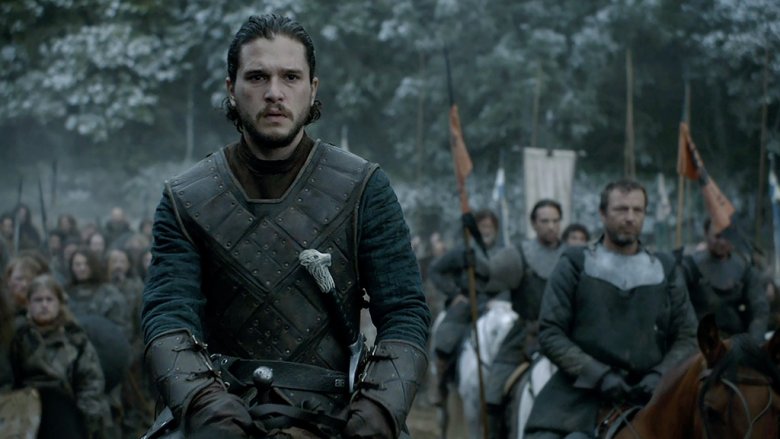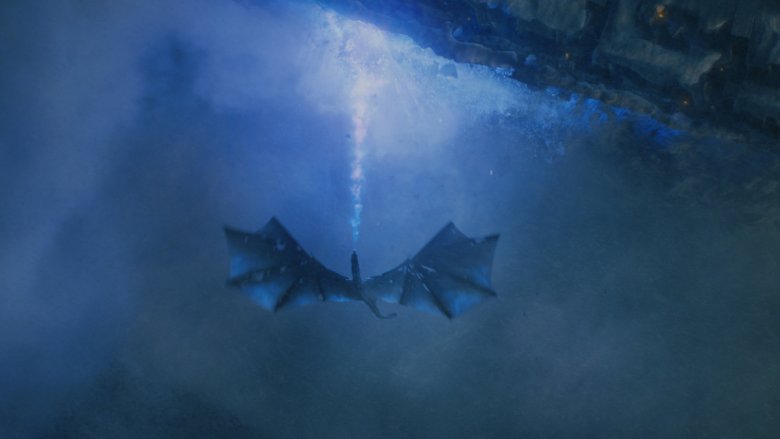Game Of Thrones Episodes You Need To Watch Before The Final Season
On April 14, 2019, HBO will air the hotly anticipated final season of its hit series Game of Thrones around the world, to the delight of millions of excited fans. Since the seventh and penultimate season finished airing in the summer of 2017, fans have endured quite a long wait to see how the show will wrap up and whether their favorite characters, from Jon Snow to Arya Stark to Daenerys Targaryen, will die, survive, or even thrive by the time the final season's six episodes come to a close.
Diehard fans have planned out their rewatch schedules almost to the day to line up with the premiere, but whether you're a devotee who can't carve out the time or a complete Game of Thrones newbie who wants to get in on the action, here are 13 can't-miss episodes you need to watch (or re-watch) before the final season. Spoilers to follow.
Season 1, Episode 1: Winter is Coming
What better way to start than with the pilot? In "Winter is Coming," audiences are introduced to the honor-driven and high-born Stark family, led by patriarch Ned Stark (Sean Bean), a just lord who rules the North faction of Westeros with a steady hand (and as it happens, "winter is coming" is the house's motto). Surrounded by his family, including his apparent bastard son Jon Snow (Kit Harington), Ned gets inadvertently involved in a political scheme after hearing that the Hand of the King has died, also fielding a visit from the royal family.
Beyond that, his children all get their own direwolves after finding a litter in the forest; viewers meet a young and meek Daenerys Targaryen (Emilia Clarke) just before her arranged marriage; and the episode closes with Bran Stark (Isaac Hempstead-Wright) being pushed out of a window after accidentally discovering an incestuous royal relationship between Cersei and her twin Jaime (Lena Headey and Nikolaj Coster-Waldau). Pair that with a (literal) cold open featuring the first glimpse of a White Walker, and you've got quite the start to the series.
Season 1, Episode 9: Baelor
"Baelor" is one of the most famous episodes in the entire series, based solely on the fact that it's an expert class in subverting audience expectations. For the entirety of the first season, viewers aligned themselves with Ned, who seems to be the hero of the show, but by the ninth episode, Ned, now the Hand of the King, has been attacked and subsequently imprisoned in King's Landing, the royal capital of Westeros, for high treason — specifically, for claiming (correctly) that the late king's son and heir, Joffrey Baratheon (Jack Gleeson) is not a Baratheon at all, but the product of incest between Cersei and Jaime, and therefore an usurper to the throne.
Joffrey promises mercy for Ned, seemingly to appease Ned's daughter Sansa (Sophie Turner) to whom Joffrey is engaged, but considering Joffrey has already been revealed as a sociopath, a happy ending doesn't feel likely. Naturally, Joffrey goes back on his promise, essentially beginning a land war between the Starks and Lannisters with one fell swoop of a sword that decapitates Ned Stark, leaving viewers wondering if they'll ever be able to predict what might happen on Thrones.
Season 2, Episode 9: Blackwater
Even though Thrones is now known for its intense, high-budget battles, season 2 brought the first big skirmish with "Blackwater," which chronicled an invasion by the Baratheon army led by Stannis (Stephen Dillane), the brother of the late King Robert and apparent heir to the Iron Throne, against King's Landing. Tyrion saves the city and its entire population by utilizing "wildfire," a potentially magical and extremely flammable substance, against the invading forces, but is nearly assassinated by a member of his own army, saved only by the bravery of his loyal squire Podrick Payne (Daniel Portman). Tyrion, now permanently scarred and unrecognized as the savior of the capital, knows his life is at risk on and off the battlefield.
During the battle, we also see the best and worst sides of other characters (but mainly the worst) — Joffrey, who lays claim to the victory, spends most of the battle hiding in fear, while an extremely drunk Cersei, after emotionally tormenting a terrified Sansa, carries her youngest son, Tommen, to the Iron Throne and is poised to poison them both until her father, Tywin Lannister (Charles Dance), arrives and announces victory. It's a low point for some of the Lannisters, but as usual, they somehow come out on top.
Season 3, Episode 5: And Now His Watch Is Ended
There's plenty to chew on in this mid-season Thrones episode, including a mutiny beyond the Wall that results in the death of the Lord Commander of the Night's Watch, Jeor Mormont (who happens to be the father of another major character, Jorah Mormont), the aftermath of Jaime losing his sword hand while in captivity, and some master manipulation by Joffrey's eventual bride, Margaery Tyrell (Natalie Dormer), but the most unforgettable image comes at the end of the episode, courtesy of Daenerys Targaryen.
Daenerys, currently in Astapor (a major city in Slaver's Bay), has agreed to trade her largest dragon, Drogon, for the army currently residing in the metropolis — a collection of 8,000 warriors known as the Unsullied. Though her advisors are horrified, Daenerys makes a careful play that ends in a powerful and undeniable show of her own strength, the murder of the slave masters, the Unsullied becoming free men (who agree to follow her), and the Khaleesi's boldest moment yet in the series, culminating in her riding away victorious with a brand new battalion.
Season 3, Episode 9: The Rains of Castamere
Faithful readers of A Song of Ice and Fire, the series on which Thrones is based, knew the Red Wedding was coming, but it didn't make watching it any easier. After going back on a promise to marry one of Walder Frey's (David Bradley) daughters, Robb Stark (Richard Madden) was in the vengeful old man's crosshairs, but Walder pretended he would accept Robb's uncle as a son-in-law instead. After inviting Robb, his mother Catelyn (Michelle Fairley), and his pregnant wife Talisa (Oona Chaplin) to the festivities, Walter orchestrated the brutal slaughter the Stark faction during the reception with the help of the traitorous Bolton clan.
Whether or not you've seen the episode before, the feeling of dread that intensifies once the doors lock behind the Starks and the opening strains of the titular song, "The Rains of Castamere" (which itself describes a massacre) is undeniable. Despite being one of the hardest episodes of the show to watch, it's necessary — both to understand the turmoil in Westeros and to understand how far the show will go to intensify the plot.
Season 4, Episode 2: The Lion and the Rose
Weddings are usually pretty ugly affairs on Thrones, and though the Purple Wedding that takes place during "The Lion and the Rose" is no exception, it's a slightly more satisfying act of violence than audiences are used to. Though a few parts of the episode have a focus beyond King's Landing, including Stannis burning a few of his relatives at the stake for "reasons" and yet more evidence that Ramsay Bolton (Iwan Rheon) is the absolute worst, most of it is the long-awaited Royal Wedding in King's Landing. Joffrey is all set to wed Margaery Tyrell, much to his mother Cersei's dismay, and spends most of his time before and during his wedding tormenting his long-suffering uncle Tyrion, who has recently wed Sansa Stark in an effort to gain control of the North, as well as making his guests totally uncomfortable.
However, it isn't long before Joffrey chokes to death on poisoned wine, pointing at his uncle before he dies. Tyrion, presumed guilty, is dragged away, while Sansa makes a daring escape from the capital. Audiences had been eagerly waiting for Joffrey's demise, making this an episode for the ages, especially considering it was the last one series author George R.R. Martin penned for the show.
Season 4, Episode 8: The Mountain and the Viper
Thanks to the Purple Wedding, Tyrion spends the rest of the fourth season wrongfully imprisoned for Joffrey's murder, and after a harrowing trial where everyone he's ever met (including his wronged lover) testifies to his guilt, Tyrion returns to a tactic he successfully employed once before — demanding a trial by combat. (Though Tyrion's testimony happens two episodes before, it is definitely worth watching.) At first, nobody volunteers to be Tyrion's champion and face down the Mountain, a terrifying and gigantic fighter representing Tyrion's conniving sister Cersei, but eventually, Oberyn Martell (Pedro Pascal), whose sister was raped and killed by the Mountain, offers his spear in Tyrion's defense.
Tyrion's first trial by combat ended well for him, so the audience may have expected it to work out a second time, but let's not forget what Game of Thrones is all about. After felling the Mountain with a poisoned spear, it seems like Oberyn has won, until his hubris gets the best of him and the Mountain knocks him down mid-taunt and squashes Oberyn's head like a bug in one of the show's most gruesome sequences to date. With Tyrion's fate now officially in question, audiences waited anxiously to see how he could get out of this one (which, eventually, he does).
Season 5, Episode 8: Hardhome
Another famous battle episode of Thrones — hailed as one of the best throughout the entire series — "Hardhome" spends some fleeting time down South, checking in on Jorah's fraught return to Mereen (with Tyrion in tow) as Daenerys rebuffs him as well as Cersei's imprisonment for incest at the hand of the conservative High Sparrow, but focuses mainly on a battle only fleetingly mentioned in the original book series (a move which left obsessive fans of George R.R. Martin's original epic significantly less smug as the episode ended).
Jon, despite opposition from the Night's Watch (which he now leads), has journeyed beyond the Wall to Hardhome, a village of Wildlings with no interest in his Southern perspective until he manages to convince them of the growing threat of the White Walkers with the help of his Wildling ally, Tormund Giantsbane (Kristofer Hivju). Just as they begin to load Wildling men, women, and children into boats to send them to the Wall, they are attacked by wights, and even though Jon manages to kill a White Walker using Valyrian steel, as they leave, both the survivors of the battle and audiences are left with the unforgettable image of the Night King raising the dead as new wights, at least doubling his army. This is Thrones at its best — staging an enormous action set piece that leaves viewers stunned beyond belief.
Season 5, Episode 10: Mother's Mercy
As season 5 ended, so did the series' source material — with A Dance of Dragons, the sixth book in A Song of Ice and Fire, still unreleased, putting plenty of pressure on showrunners David Benioff and D.B. Weiss to shake things up in a big way in order to set up completely uncharted territory in the sixth season. An Emmy winner for both writing and directing, this season finale provided plenty of action, including Theon (Alfie Allen) and Sansa's escape from the Ramsay Bolton-run Winterfell, the death of Myrcella Baratheon, Stannis' defeat, and Arya's first check mark on her kill list and subsequent punishment, but two characters, Cersei and Jon Snow, ultimately take center stage.
After confessing to her crimes, Cersei faces her punishment at the hands of the High Sparrow, and in a now infamous "walk of shame," she is forced to walk through the streets of King's Landing naked with her hair shorn as her people assault her. Cersei might have it pretty bad in this episode, but she can't top Jon's problems, which culminate in his assassination at the hands of his own men in the Night's Watch. Leaving audiences to wonder about Jon's fate for a year (and frequently lying about it) seems like a pretty harsh move, but the Thrones showrunners aren't often known for their generosity.
Season 6, Episode 2: Home
Luckily, fans didn't have to wait long into the show's sixth season to find out what would happen to Jon Snow (even though the sixth season premiere featured plenty of agonizing shots of his prone, lifeless body, just to torture viewers). As Wildlings loyal to Jon quell the insurrection of disloyal Night's Watchmen, Melisandre (Carice van Houten), the show's most prominent Red Witch, finally revives a gasping Jon Snow in the episode's final tense moments, giving audiences much-needed closure on the fate of one of their favorite characters.
Even though the episode closed on this long-awaited moment, there was plenty happening in the buildup — Tyrion, in Daenerys' absence, interacts with dragons and escapes with his life (further fueling rumors that Tyrion is himself part-Targaryen), Ramsay murders his father and stepmother, Bran (returning to the show after being absent for an entire season) assumes his new role as the Three-Eyed Raven, and Euron Greyjoy, the ruler of the Iron Islands, is murdered by his own brother. However, the image of Jon returning from the dead is the image most associated with "Home," proving that sometimes, Thrones can provide its fans with a good outcome.
Season 6, Episode 9: Battle of the Bastards
Another Emmy winner for writing and directing, season 6's "Battle of the Bastards" provided fans with yet another hotly anticipated moment — specifically, the showdown between Ramsay Bolton and Jon Snow over control of Winterfell, as well as to defend the Stark family's name and honor against the savage Bolton clan. Not content with one battle, the episode opens with a staggering assault by Daenerys on the slave masters of Mereen as she burns their ships to a crisp, but quickly turns its attention back to Winterfell, where Jon is waging his own war against Ramsay.
After Jon refuses to hand over Sansa and Rickon, the youngest Stark, dies at Ramsay's hands, the battle finally begins, and with Jon in several life-threatening situations amidst a dwindling force of Stark bannermen, all seems lost, until Petyr "Littlefinger" Baelish (Aidan Gillen) arrives with his own forces at Sansa's behest. Once Ramsay and Jon end up in direct hand-to-hand combat, Ramsay's smugness can't overcome Jon's sheer fury, and the Bolton bastard ends up beaten to a pulp, eventually meeting a gruesome end when Sansa turns his own starving hounds on him. From Ramsay's death to the unfurling of Stark banners on the walls of Winterfell, "Battle of the Bastards" is a rare satisfying episode of Thrones, and remains a fan favorite.
Season 7, Episode 4: The Spoils of War
The show's penultimate season had the daunting task of moving each character closer in anticipation of several final showdowns, and one of the show's shorter entries, "The Spoils of War," did just that, nudging chess pieces together to explosive effect. This episode finds time to give audiences a touching and long-awaited Stark reunion, bringing Arya back to Winterfell and to both Sansa and Bran — as well as a delightfully choreographed swordfight between Arya and Brienne of Tarth (Gwendoline Christie), who are a well-matched pair of fighters by this point in the series. Meanwhile, Daenerys and Jon, who have also joined force by this point, make some important realizations about the history of White Walkers, which could potentially inform how they fight them later.
However, the main set piece of this episode is the attack on Jaime Lannister's army as they travel to King's Landing with caravans full of gold, which are destroyed by a lethal combination of Daenery's Dothraki army as well as Drogon, whom she rides into battle. Even though Bronn (Jerome Flynn) lands a shot on Drogon, Daenerys still easily wins the battle and nearly kills Jaime in the process, giving fans a perfectly executed battle sequence complete with a staggering cliffhanger.
Season 7, Episode 10: The Dragon and the Wolf
Though many critics found Thrones' seventh season to be somewhat uneven, there's no denying that it ended with a bang, thanks to a long-suspected reveal about Jon Snow's real parentage. Besides Sansa and Arya coming together and Cersei and Daenerys attempting (and failing) to form some sort of legitimate negotiation concerning the White Walkers, Bran and Sam Tarly (John Bradley) discover that Jon is not actually the bastard son of Ned Stark, but the product of a loving relationship and secret marriage between Lyanna Stark, Ned's late sister, and Rhaegar Targaryen, Daenerys' brother and the true heir to the throne. Since this makes Jon Daenerys' nephew, as well as her biggest rival where the Iron Throne is concerned, it's especially awkward that the episode relays this revelation over Daenerys and Jon's first night together.
Jon's real identity as Aegon Targaryen will certainly carry plenty of weight in season 8, but the most important moment of the season 7 finale is still the destruction of the Wall, which audiences previously thought couldn't be felled by any force. Thanks to his new ice dragon (which he gained thanks to an ill-advised mission by Daenerys, Jon, and their forces to the far North), the Night's King is able to crumble entire sections of the Wall, setting up the real war to come that reaches far beyond the Iron Throne.
